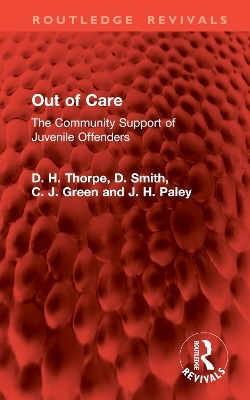
Out of Care
The Community Support of Juvenile Offenders
Seiten
2024
Routledge (Verlag)
978-1-032-81854-2 (ISBN)
Routledge (Verlag)
978-1-032-81854-2 (ISBN)
Debate on the treatment of juvenile delinquents, was usually presented as being between the exponents of ‘law and order’ and punishment on the one hand, and the ‘soft’ advocates of social work and treatment on the other. this title argued instead that it was the juvenile justice system itself which was at fault
The late 1970s saw the emergence of a heated debate on the treatment of juvenile delinquents. The argument was usually presented as being between the exponents of ‘law and order’ and punishment on the one hand, and the ‘soft’ advocates of social work and treatment on the other. Originally published in 1980, Out of Care: The Community Support of Juvenile Offenders took issue with both sides and argued that it was the juvenile justice system itself which was at fault. Much of the debate about the merits or otherwise of the 1969 Children and Young Persons Act had been conducted in an informational vacuum. For the authors, the most important point is that while this self-interested and politically disingenuous debate had been continuing more and more supposedly delinquent children had been locked up, quite contrary to the intentions of the Act.
The book, however, goes further than a mere critique of the existing system at the time. It also offers very direct and practical advice on what can be done – advice aimed at the police and magistrates, and especially at social workers and probation officers, both agency managers and field level practitioners. It describes practical ways of collecting information to modify local policies and suggests innovative and imaginative ways of working face to face with juvenile offenders. The book is unusual in that it combines this practical usefulness with a detailed analysis of certain key themes in contemporary criminological theory.
All the authors had backgrounds in social work or probation practice, as well as recent experience of research into intermediate treatment and the workings of the juvenile justice system at the time. They were therefore able to offer a unique combination of perspectives, drawing on social policy, theories of delinquency, justice and the state, field research and social work practice.
The late 1970s saw the emergence of a heated debate on the treatment of juvenile delinquents. The argument was usually presented as being between the exponents of ‘law and order’ and punishment on the one hand, and the ‘soft’ advocates of social work and treatment on the other. Originally published in 1980, Out of Care: The Community Support of Juvenile Offenders took issue with both sides and argued that it was the juvenile justice system itself which was at fault. Much of the debate about the merits or otherwise of the 1969 Children and Young Persons Act had been conducted in an informational vacuum. For the authors, the most important point is that while this self-interested and politically disingenuous debate had been continuing more and more supposedly delinquent children had been locked up, quite contrary to the intentions of the Act.
The book, however, goes further than a mere critique of the existing system at the time. It also offers very direct and practical advice on what can be done – advice aimed at the police and magistrates, and especially at social workers and probation officers, both agency managers and field level practitioners. It describes practical ways of collecting information to modify local policies and suggests innovative and imaginative ways of working face to face with juvenile offenders. The book is unusual in that it combines this practical usefulness with a detailed analysis of certain key themes in contemporary criminological theory.
All the authors had backgrounds in social work or probation practice, as well as recent experience of research into intermediate treatment and the workings of the juvenile justice system at the time. They were therefore able to offer a unique combination of perspectives, drawing on social policy, theories of delinquency, justice and the state, field research and social work practice.
David H. Thorpe, David Smith, Christopher J. Green and John H. Paley
Foreword. Acknowledgements. 1. The 1969 CYPA and Its Aftermath 2. Decarceration, Welfare and Law 3. Labelling and Social Work 4. Demystifying the System 5. A New Framework for Social Work with Juvenile Offenders 6. Beyond Individuation: Diversion and Atonement 7. Working with Adolescent Offenders 8. The Organisation and Development of Community Support. Index.
| Erscheinungsdatum | 21.08.2024 |
|---|---|
| Reihe/Serie | Routledge Revivals |
| Verlagsort | London |
| Sprache | englisch |
| Maße | 138 x 216 mm |
| Gewicht | 520 g |
| Themenwelt | Sachbuch/Ratgeber ► Gesundheit / Leben / Psychologie |
| Studium ► Querschnittsbereiche ► Prävention / Gesundheitsförderung | |
| Recht / Steuern ► EU / Internationales Recht | |
| Recht / Steuern ► Strafrecht ► Besonderes Strafrecht | |
| Recht / Steuern ► Strafrecht ► Kriminologie | |
| Sozialwissenschaften ► Pädagogik ► Sozialpädagogik | |
| Sozialwissenschaften ► Soziologie | |
| ISBN-10 | 1-032-81854-9 / 1032818549 |
| ISBN-13 | 978-1-032-81854-2 / 9781032818542 |
| Zustand | Neuware |
| Haben Sie eine Frage zum Produkt? |
Mehr entdecken
aus dem Bereich
aus dem Bereich
das Manual zur psychologischen Gesundheitsförderung
Buch | Hardcover (2023)
Springer Berlin (Verlag)
CHF 55,95
Orthomolekulare Medizin in Prävention, Diagnostik und Therapie
Buch | Hardcover (2022)
Thieme (Verlag)
CHF 81,80


